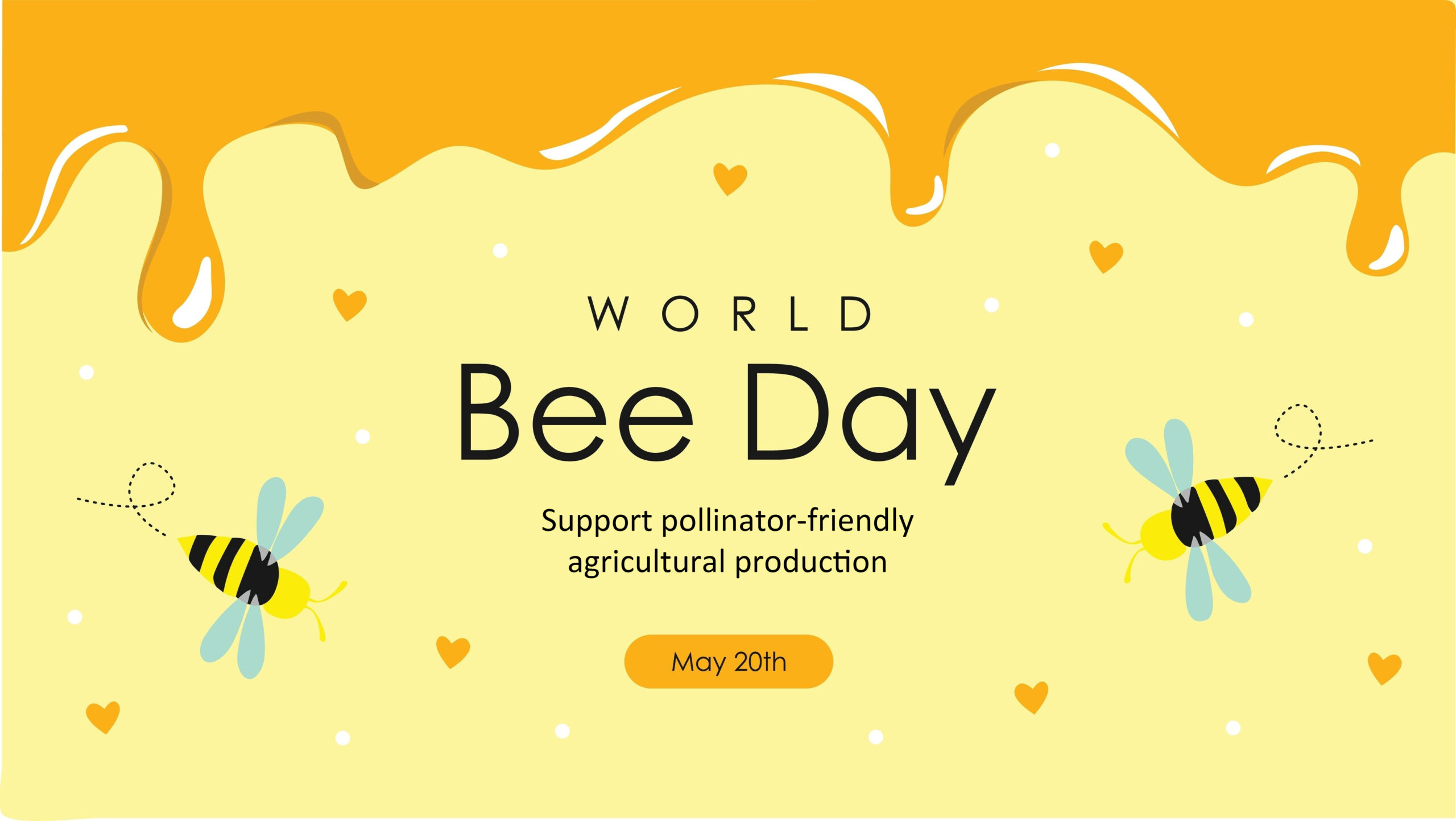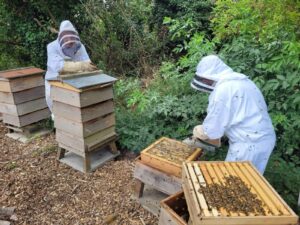This Saturday (20 May) is World Bee Day – a day that continues to grow in prominence for its role in highlighting sustainable development.
The BBA is a proud supporter of individuals and organisations making a positive difference to the environment we live and work in. Creating a future that generations beyond us will enjoy, and reap benefit from, is something we feel very strongly about. So, with the upcoming World Bee Day, we felt it a great opportunity to shine light on one of our own bee expert and Principal Certification Scientist, Luke Adams, and asked him to share his views on this year’s theme: ‘Bee engaged in pollinator-friendly agricultural production’.
About World Bee Day
World Bee Day 2023 calls for global action to support pollinator-friendly agricultural production and highlights the importance of protecting bees and other pollinators, particularly through evidence-based agricultural production practices. Pollinators such as bees, birds and bats, affect 35 per cent of the world’s crop production.
Pollination is a fundamental process for the survival of our ecosystems. Not only do pollinators contribute directly to food security, but they are key to conserving biodiversity, so how can everyone help their efforts?
Looking at practical examples of where we can make a difference, Luke raises a view, “Do we really need nicely cut grass at the edges of roadsides and on grass verges in surrounding houses? Yes, they might look nicer, but if left they will naturally grow wild meadows with wildflowers that not only look nicer (in my opinion) but are also very attractive to insects,” he says.
“Many farms have lost their hedgerows to make way for more land to grow crops,” Luke adds, “but farmers are now realising the importance to nature for these hedgerows and are also growing several rows of wildflowers around the edges of their crops to attract insects and pollinators – if you watch Clarkson’s Farm on Amazon Prime you will see this!”
Another factor affecting pollinators is the use of pesticides designed to artificially enhance crop production, but these can disorientate or even have fatal consequences for bees. Luke, who keeps hives at both our Garston and Croxley locations, says farmers have a responsibility to limit their use for the good of others.
“I only hear about pesticides from news stories and luckily I have not suffered any losses from them yet,” he says. “I do know of other beekeepers who have lost their whole site because a local farmer was using a pesticide without notifying them. Of course, farmers earn a living, and they want to make the most of their crops, so using pesticides can help achieve this. Farmers should really log onto the BBKA Beekeepers website to find out any beekeepers in their area and get in touch with them with a planned spraying date. Beekeepers could then close up their hives on this date to protect their bees.”
As the world becomes more aware of initiatives such as World Bee Day, Luke says there’s been a noticeable uplift in the number of people wanting to help with conservation work.
“This is my 19th year beekeeping and I have noticed more and more people take up this hobby mostly to help protect the bees,” he highlights. “Sadly, wild bee colonies don’t really last more than a year nowadays due to diseases, but people can prevent these diseases by looking after the bees.
“One thing we could all do is plant wildflowers in our gardens. You can also plant “bee-bombs” which are bombs of seeds.” Click here to find out more: Beebombs
Luke spreads the good news regularly by inviting colleagues to come part of initiatives such as ‘Become a beekeeper for a day,’ and giving them personal tours of his hives at our Test facility and Head Office locations.
For more about World Bee day, visit https://www.fao.org/world-bee-day/en
Share This Story, Choose Your Platform!
Related News
This Saturday (20 May) is World Bee Day – a day that continues to grow in prominence for its role in highlighting sustainable development.
The BBA is a proud supporter of individuals and organisations making a positive difference to the environment we live and work in. Creating a future that generations beyond us will enjoy, and reap benefit from, is something we feel very strongly about. So, with the upcoming World Bee Day, we felt it a great opportunity to shine light on one of our own bee expert and Principal Certification Scientist, Luke Adams, and asked him to share his views on this year’s theme: ‘Bee engaged in pollinator-friendly agricultural production’.
About World Bee Day
World Bee Day 2023 calls for global action to support pollinator-friendly agricultural production and highlights the importance of protecting bees and other pollinators, particularly through evidence-based agricultural production practices. Pollinators such as bees, birds and bats, affect 35 per cent of the world’s crop production.
Pollination is a fundamental process for the survival of our ecosystems. Not only do pollinators contribute directly to food security, but they are key to conserving biodiversity, so how can everyone help their efforts?
Looking at practical examples of where we can make a difference, Luke raises a view, “Do we really need nicely cut grass at the edges of roadsides and on grass verges in surrounding houses? Yes, they might look nicer, but if left they will naturally grow wild meadows with wildflowers that not only look nicer (in my opinion) but are also very attractive to insects,” he says.
“Many farms have lost their hedgerows to make way for more land to grow crops,” Luke adds, “but farmers are now realising the importance to nature for these hedgerows and are also growing several rows of wildflowers around the edges of their crops to attract insects and pollinators – if you watch Clarkson’s Farm on Amazon Prime you will see this!”
Another factor affecting pollinators is the use of pesticides designed to artificially enhance crop production, but these can disorientate or even have fatal consequences for bees. Luke, who keeps hives at both our Garston and Croxley locations, says farmers have a responsibility to limit their use for the good of others.
“I only hear about pesticides from news stories and luckily I have not suffered any losses from them yet,” he says. “I do know of other beekeepers who have lost their whole site because a local farmer was using a pesticide without notifying them. Of course, farmers earn a living, and they want to make the most of their crops, so using pesticides can help achieve this. Farmers should really log onto the BBKA Beekeepers website to find out any beekeepers in their area and get in touch with them with a planned spraying date. Beekeepers could then close up their hives on this date to protect their bees.”
As the world becomes more aware of initiatives such as World Bee Day, Luke says there’s been a noticeable uplift in the number of people wanting to help with conservation work.
“This is my 19th year beekeeping and I have noticed more and more people take up this hobby mostly to help protect the bees,” he highlights. “Sadly, wild bee colonies don’t really last more than a year nowadays due to diseases, but people can prevent these diseases by looking after the bees.
“One thing we could all do is plant wildflowers in our gardens. You can also plant “bee-bombs” which are bombs of seeds.” Click here to find out more: Beebombs
Luke spreads the good news regularly by inviting colleagues to come part of initiatives such as ‘Become a beekeeper for a day,’ and giving them personal tours of his hives at our Test facility and Head Office locations.
For more about World Bee day, visit https://www.fao.org/world-bee-day/en
Share This Story, Choose Your Platform!
Related News
Get in touch
Please complete the form below and we will contact you as soon as possible.
To help us to respond to your inquiry as quickly as possible, we have put a handy list of our services below.



